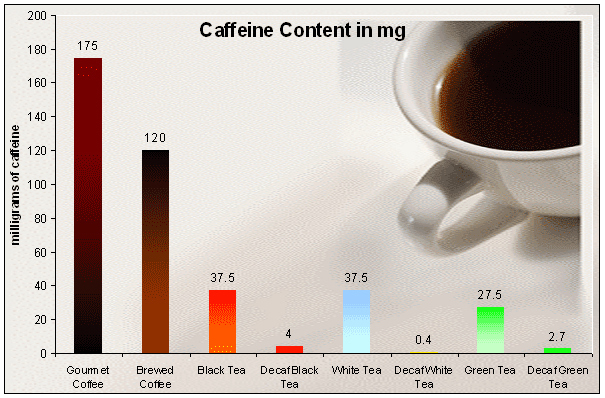
The amino acid l-theanine helps prevent jitters and the anxious feeling you get from high caffeine intake. Have you ever noticed that you feel extremely calm yet alert after drinking a few strong cups of tea? That’s the synergistic effect of the caffeine and l-theanine. Studies suggest that l-theanine has an interesting effect on the brain because it promotes relaxation without making you feel drowsy. L-theanine is an amino acid found naturally in black tea, green tea, and certain species of mushrooms. We’ll jump into the specific health benefits below but you should know that in terms of caffeine content, tea comes with one big added benefit: l-theanine. Steep it for five minutes and you’ll have over 60 mg of caffeine. It has 59 mg of caffeine in every 8-ounce cup of tea steeped for just one minute. If you’re looking for more of a caffeine boost from tea alone, try Tazo’s Awake variety. The longer you steep your tea, the more caffeine content you’ll get. Lipton black tea, which is what you’ll get if you ask for “tea” almost anywhere in the world (even most of the Middle East), has between 17 and 47 mg depending on how long you steep it for. What is the average green tea caffeine content Both Lipton Green Tea and Lipton Matcha Green Tea contain between 28-38 mg of caffeine. That’s an average that varies drastically by brand.
/SPR_765281-how-much-caffeine-in-green-tea-5ac617a7ae9ab80037d57e38.png)
Tea drinkers will be happy to know that a cup of tea has about 42 mg of the good stuff on average - so about 50% less caffeine than coffee. As they dry, tea leaves oxidize which changes the color and flavor. Both coffee and tea naturally contain caffeine, but differ significantly in the amount. However, several cultures around the world grow their own indigenous versions of tea in places like Turkey, India, and Japan. The first tea as we know it dates back to the third century in ancient China.

All types of true tea from this plant ( 2): Tea leaves, on the other hand, comes from the tea plant camellia sinesis. The heat from roasting forces the natural sugars through a caramelization process which changes the chemical composition, flavor, color, and aroma. A standard cup of black tea contains anywhere between 14-70 milligrams of caffeine, and green tea usually contains 24-45 milligrams of caffeine per cup. After a meticulous and labor-intensive picking and selection process, the berries are dried and the flesh is removed from the bean. While generally known as beans, coffee begins its journey as red berries. Yemen and East Africa still produce some of the world’s best coffee to this day! ( 1) Indigenous to Yemen and Ethiopia, people have consumed coffee as we know it since the 15th century.

A handpicked selection of stories from BBC Future, Earth, Culture, Capital, Travel and Autos, delivered to your inbox every Friday.Coffee and tea come from two totally different plants and are made from completely different production processes.Ĭoffee comes from coffee beans. If you liked this story, sign up for the weekly bbc.com features newsletter, called “If You Only Read 6 Things This Week”.

He is on Twitter.įollow us on Facebook, Twitter, Google+, LinkedIn and Instagram. Based purely on its composition, coffee should win hands down: a cup of tea has about half the dose (40 milligrams) of the stimulant caffeine that you would find in a standard cup of brewed filter. Based solely on the fact that it allows you to get a better night’s sleep, we declare tea the winner – but why not share your own thoughts with us through social media?ĭavid Robson is BBC Future’s feature writer. In a cup of tea, the amount varies from 14 to 61 mg. But when we talk about a serving of each drink, a cup of black coffee has about 95 mg of caffeine. Overall verdict: Much as we Brits would have liked tea to come out the clear victor, we have to admit there is little between the two drinks besides personal taste. Tea vs Coffee Tea leaves contain 3.5 caffeine, while coffee beans contain 1.1 to 2.2 caffeine. Verdict: Another draw – both drinks are a surprising, health-giving elixir. Both drinks also seem to moderately protect the heart, although the evidence seems to be slightly stronger for coffee, while tea also appears to be slightly protective against developing a range of cancers – perhaps because of its antioxidants.


 0 kommentar(er)
0 kommentar(er)
